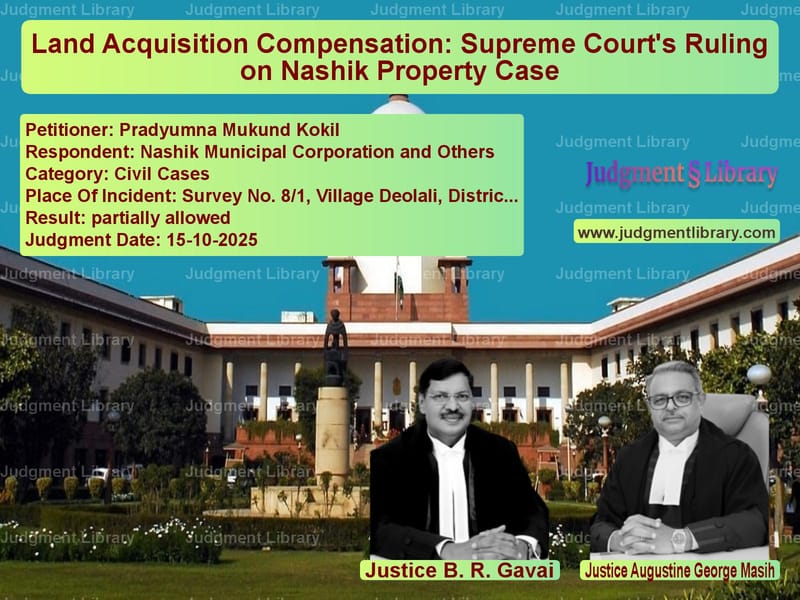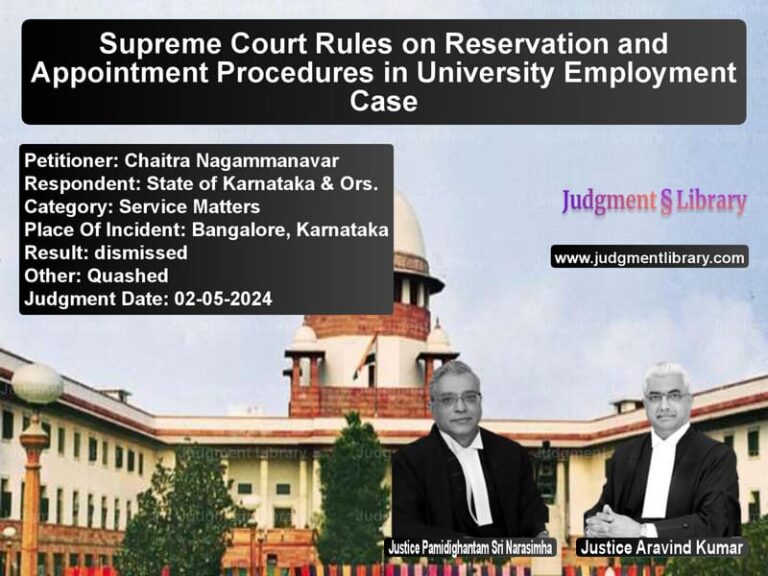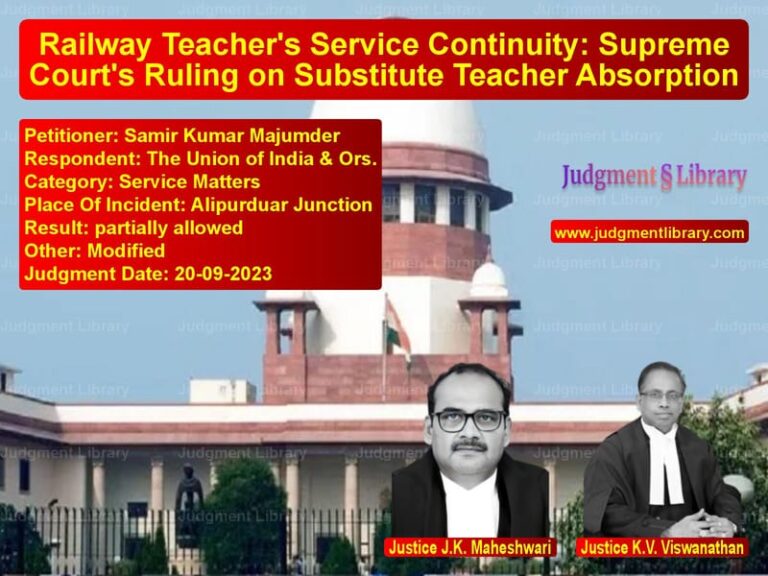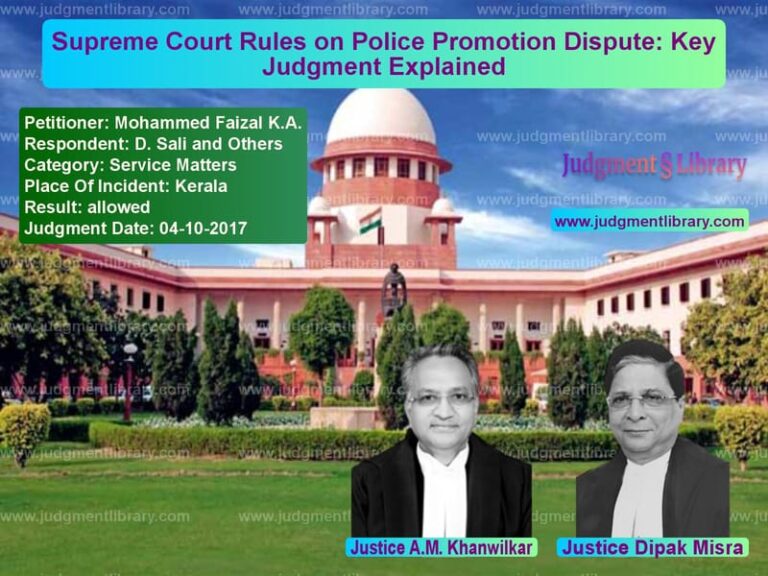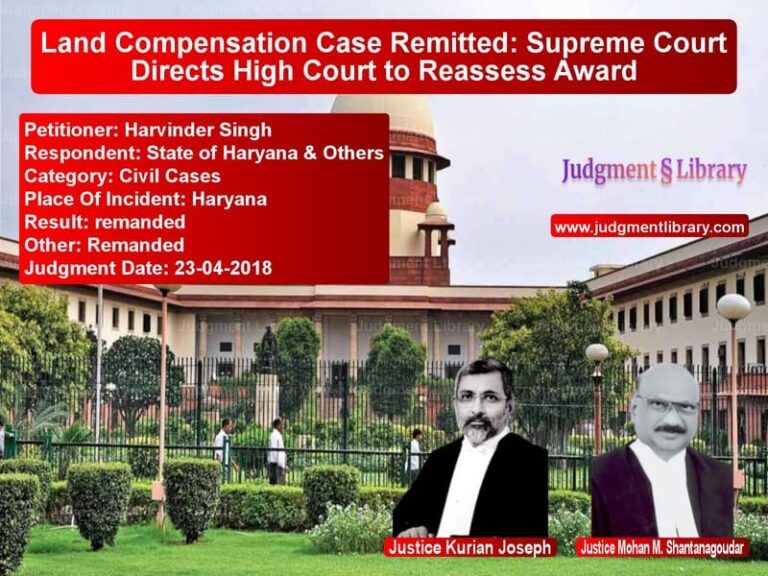Land Acquisition Compensation: Supreme Court’s Ruling on Nashik Property Case
In a significant judgment delivered on October 15, 2025, the Supreme Court of India resolved a complex land acquisition dispute that had been ongoing for over five decades. The case involved a prime piece of land in Nashik, Maharashtra, and raised important questions about fair compensation, municipal authority, and property rights that had been contested since 1972.
The Historical Background of the Case
The dispute centered around Survey No. 8/1 in Village Deolali, Nashik, measuring 1 hectare and 38 Ares (13,800 square meters). The story began in 1972 when the Nashik Road-Deolali Municipal Council (now Nashik Municipal Corporation) resolved to reserve this entire land for public purposes including a high school, playground, and development plan roads. On June 22, 1972, the Municipal Council took possession of 37 Ares (3,700 square meters) from this survey number for public use, but crucially, without following the formal acquisition process under the Land Acquisition Act, 1894.
Six years later, in 1978, a notification was issued acquiring only 1 hectare and 1 Ares (10,100 square meters), leaving the remaining 37 Ares outside the acquisition. Despite this, the Corporation continued to retain possession and use of the unacquired portion for road purposes without any legal title. This irregular situation set the stage for a legal battle that would span generations and involve multiple rounds of litigation.
The Early Legal Battles
The original owner of the land, recognizing that the reservation had lapsed according to the Maharashtra Regional and Town Planning Act (MRTP Act), submitted an application on August 11, 1995, along with a development plan under Section 127 of the MRTP Act to the Corporation. When the Corporation failed to respond, the matter reached the High Court through Writ Petition (Civil) No.4184 of 1995.
On November 12, 1998, the High Court accepted the original owner’s plea that the reservation over the land had indeed lapsed. The Court directed the submission of fresh development plans and ordered that the respondents consider these without raising the question of reservation. However, when the original owner approached the Corporation again seeking sanction for developing the 37 Ares land, the request was rejected on December 27, 1999, with the Corporation claiming it owned and possessed the land.
The Appellant Enters the Legal Scene
After several rounds of litigation, including another Writ Petition and a Special Leave Petition that reached the Supreme Court, Pradyumna Mukund Kokil entered the scene. On July 29, 2011, he purchased the 37 Ares land from the original owner through a registered Conveyance Deed for ₹1,17,00,000 (One Crore Seventeen Lakhs). This purchase came after the Supreme Court had dismissed the State’s SLP and various High Court orders had clarified the legal position regarding the land.
The new owner then approached the High Court through Writ Petition No.11709 of 2012, praying for a direction that the land be acquired by the State since it had been utilized for constructing roads. The Corporation took a surprising stand, claiming that by continuous possession since 1972, it had become the owner of the land by adverse possession.
The Acquisition Process Finally Moves Forward
After contempt proceedings and Supreme Court intervention, the acquisition process finally moved forward. The Court directed the State Government to complete the acquisition expeditiously, granting exemption from certain procedures under the Right to Fair Compensation and Transparency in Land Acquisition, Rehabilitation and Resettlement Act, 2013. On January 9, 2017, a preliminary notification was issued, culminating in an award dated April 29, 2017, by the Special Land Acquisition Officer, Nashik.
The award assessed total compensation at ₹8,69,46,650 (Eight Crore Sixty-Nine Lakh Forty-Six Thousand Six Hundred and Fifty), which included benefits under Section 26 of the 2013 Act, including solatium and additional compensation. The appellant accepted this amount under protest and issued a Possession Receipt on May 8, 2017, formally transferring possession and ownership of the acquired land.
The Compensation Battle Reaches Higher Courts
Dissatisfied with the compensation assessment and the non-grant of benefits for the Corporation’s illegal occupation from 1972 to 2017, the appellant filed a reference on May 26, 2017. The Land Acquisition, Rehabilitation and Resettlement Authority, Nagpur, allowed the reference and significantly enhanced the compensation to ₹20,20,11,533 (Twenty Crore Twenty Lakh Eleven Thousand Five Hundred and Thirty-Three).
More remarkably, the Authority granted rental compensation for the period from June 22, 1972, to January 9, 2017, amounting to a staggering ₹238,87,00,000 (Two Hundred Thirty-Eight Crores and Eighty-Seven Lakhs) for the illegal occupation and possession by the Municipal Corporation. This award was challenged by the Corporation before the High Court, which set aside the enhanced compensation and restored the original award by the Special Land Acquisition Officer.
The Supreme Court Hearing and Arguments
Before the Supreme Court, the appellant’s senior counsel made two primary submissions. First, he challenged the compensation assessment, arguing that “the SLAO had erred in not taking into consideration the sale instances which were brought on record and pointed out by the Appellant while proceeding to take into consideration the rates as fixed under the ready reckoner by ignoring the same.”
Regarding the rental compensation, the counsel supported the Reference Court’s decision, stating that “the appellant, being deprived of beneficial ownership from 1972, was entitled to such rental compensation under both statutory and equitable principles.” He also requested that adverse observations against the appellant and the imposed costs of ₹10,00,000 be set aside.
The respondents’ senior counsel defended the High Court’s order, asserting that “the valuation as has been assessed by the SLAO was based upon the records which were made available to him at the time of working out the value of the land.” Regarding rental compensation, he argued that “the rental compensation could not have been granted as the same is not specifically provided for under the 2013 Act.”
The Supreme Court’s Detailed Analysis
The Court examined two key issues: the assessment of the land value and the entitlement to rental compensation. On the first issue, the Court emphasized that “Section 26(1)(b) read with Explanations 1 and 2 prescribes a statutory method for arriving at the market value by reference to the average sale price of similar lands in the nearest village or nearest vicinity, computed from sale-deeds or agreements to sell registered in the immediately preceding three years.”
The Court found that the Reference Court had properly applied this statutory method, noting that “the exemplar sale deeds were of lands similarly situated, abutting the same approach road and possessing comparable potentiality for development.” The Court restored the enhanced compensation of ₹20,20,11,533 awarded by the Reference Court.
The Critical Question of Rental Compensation
On the crucial question of rental compensation, the Court made significant observations. After examining the evidence, the Court noted that “the documents clearly reveal, as has been referred to above, that the property had not been in exclusive possession of the Respondent – Corporation rather actual physical possession of the subject-property was with the Original Owner.”
The Court cited established precedent, noting that “as held in R.L. Jain (supra), rental or damages for use shall be awarded only where possession is unlawfully detained by the acquiring authority prior to notification or acquisition.” However, the Court found an equitable solution, stating that “the Appellant is entitled to compensatory mesne profits/interest on that payment for the period of the State’s occupation up to the date of actual payment of compensation.”
The Court specifically held that “for the period 29.07.2011 to 08.05.2017 the Appellant is held entitled to compensation” in the form of interest at 8% per annum on the purchase price of ₹1,17,00,000.
Final Judgment and Lasting Impact
The Supreme Court allowed the appeal in part, restoring the enhanced compensation of ₹20,20,11,533 awarded by the Reference Court while denying the massive rental compensation claim of ₹238 crores. The Court also expunged the adverse observations against the appellant and waived the costs of ₹10,00,000 imposed by the High Court.
This judgment represents a balanced approach to land acquisition disputes, recognizing both the rights of property owners to fair compensation and the need for realistic assessments based on actual evidence rather than theoretical claims. The Court’s reasoning that “the approach accords with the established practice of this Court to award pre-acquisition interest/mesne-profits where the possession of land is taken by the acquiring Authority prior to completing the process of acquisition as a remedial measure under the equitable limb of the statute” provides important guidance for future cases.
The case serves as an important precedent for similar disputes across the country, particularly those involving long-standing possession issues and complex compensation calculations under the 2013 Land Acquisition Act. It underscores the importance of following proper acquisition procedures and provides clarity on how compensation should be calculated when government bodies take possession of land without completing formal acquisition processes.
Petitioner Name: Pradyumna Mukund Kokil.Respondent Name: Nashik Municipal Corporation and Others.Judgment By: Justice B. R. Gavai, Justice Augustine George Masih.Place Of Incident: Survey No. 8/1, Village Deolali, District Nashik, Maharashtra.Judgment Date: 15-10-2025.Result: partially allowed.
Don’t miss out on the full details! Download the complete judgment in PDF format below and gain valuable insights instantly!
Download Judgment: pradyumna-mukund-kok-vs-nashik-municipal-cor-supreme-court-of-india-judgment-dated-15-10-2025.pdf
Directly Download Judgment: Directly download this Judgment
See all petitions in Property Disputes
See all petitions in Damages and Compensation
See all petitions in Judgment by B R Gavai
See all petitions in Judgment by Augustine George Masih
See all petitions in partially allowed
See all petitions in supreme court of India judgments October 2025
See all petitions in 2025 judgments
See all posts in Civil Cases Category
See all allowed petitions in Civil Cases Category
See all Dismissed petitions in Civil Cases Category
See all partially allowed petitions in Civil Cases Category

